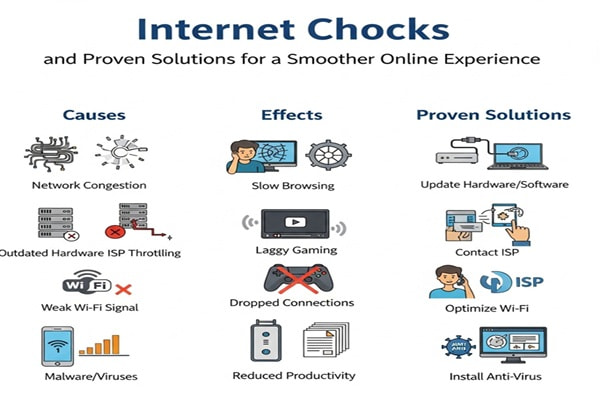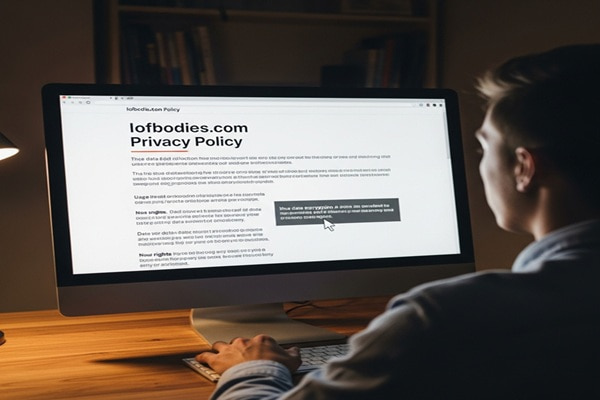
Internet Chocks: Causes, Effects, and Proven Solutions for a Smoother Online Experience

We live in a world that’s online 24/7. From remote work and streaming your favorite shows to video calls and online gaming, a stable internet connection isn’t just a convenience—it’s essential. But let’s face it, we’ve all been there: sudden slowdowns, buffering, laggy games, or interrupted video calls. These pesky interruptions are often referred to as internet chocks, and they can drive anyone crazy.
In this guide, we’ll explore what internet chocks are, why they happen, and how you can fix them—without needing a tech degree.
Table of Contents
-
What Are Internet Chocks?
-
Common Causes of Internet Chocks
-
Network Congestion
-
Weak Wi-Fi Signal
-
Outdated or Inadequate Hardware
-
ISP Throttling
-
Interference from Other Devices
-
Software or Firmware Issues
-
Environmental Factors
-
-
Effects of Internet Chocks
-
Frustrating Streaming Experience
-
Online Gaming Lag
-
Work Disruptions
-
Interrupted Online Transactions
-
Poor VoIP and Video Calls
-
-
How to Prevent and Fix Internet Chocks
-
Upgrade Your Internet Plan
-
Optimize Router Placement
-
Use a Wired Connection
-
Update Router Firmware
-
Limit Background Applications
-
Invest in a Quality Router
-
Contact Your ISP
-
-
Conclusion
-
FAQs
What Are Internet Chocks?
Internet chocks are sudden slowdowns or interruptions in your internet connection. They might show up as buffering videos, lag during gaming, or dropped video calls.
These disruptions can happen for a bunch of reasons—from network congestion and hardware limitations to interference from nearby devices or even issues with your ISP. Understanding the root causes is the first step to getting rid of them for good.
Common Causes of Internet Chocks
Let’s break down why these interruptions happen so you know exactly what you’re dealing with:
1. Network Congestion
Ever notice your internet crawls during the evening? That’s network congestion at work.
-
Multiple devices competing for bandwidth
-
Peak usage hours in your neighborhood
-
Streaming, gaming, and video calls happening at the same time
When everyone is online, the connection slows down. Simple as that.
2. Weak Wi-Fi Signal
A weak Wi-Fi signal can create random disconnects and chocks.
-
Thick walls, furniture, or appliances can block signals
-
Distance from your router matters—farther is slower
-
Even neighboring Wi-Fi networks can interfere
Tip: Place your router centrally in your home for better coverage.
3. Outdated or Inadequate Hardware
Old routers or modems just aren’t built for modern internet demands.
-
Can’t handle multiple devices efficiently
-
Struggle with high-speed connections
-
Lead to frequent chocks and buffering
Sometimes, it’s time for an upgrade.
4. ISP Throttling
Ever notice your streaming slows at certain times? That could be ISP throttling.
-
Providers may intentionally slow certain traffic like Netflix or gaming
-
Done to manage overall network load
-
VPNs sometimes help bypass throttling (more on that later)
5. Interference from Other Devices
Believe it or not, your microwave, cordless phone, or baby monitor can mess with Wi-Fi signals.
-
Devices operating on similar frequencies create signal noise
-
Can cause intermittent drops or slow speeds
6. Software or Firmware Issues
Your devices and router need updates to work smoothly.
-
Outdated router firmware may reduce performance
-
Bugs in device software can cause connectivity issues
Tip: Regularly check for updates.
7. Environmental Factors
Sometimes, it’s out of your control:
-
Severe weather like storms or heavy rain
-
Damaged cables or outdoor infrastructure
-
Temporary outages from maintenance
Effects of Internet Chocks
Internet chocks can disrupt your life in multiple ways:
Frustrating Streaming Experience
Buffering, low resolution, and constant pauses make watching movies or live events annoying.
Online Gaming Lag
High ping and latency ruin gameplay, leaving you frustrated when every second counts.
Work Disruptions
Remote work requires stable internet. Video calls, cloud apps, and collaboration tools all suffer during chocks.
Interrupted Online Transactions
Slow connections can cause payment failures or errors during online shopping or banking.
Poor VoIP and Video Calls
Zoom, Skype, Google Meet, or other VoIP services need stable internet. Chocks can make meetings glitchy or disconnect entirely.
Also Read : Tecnoregio News: Your Premier Source for Technology and Innovation Updates
How to Prevent and Fix Internet Chocks
Now that you know why they happen, here’s how to stop them:
1. Upgrade Your Internet Plan
If multiple people and devices share your network, your current plan might not be enough.
-
More bandwidth = fewer chocks
-
Look for plans that match your household’s usage
2. Optimize Router Placement
Position your router in a central, open location:
-
Avoid walls and electronics that can interfere
-
Elevate the router if possible
-
Keep it away from metal objects and microwaves
3. Use a Wired Connection
Ethernet cables aren’t just old-school—they work.
-
More stable than Wi-Fi
-
Essential for gaming, streaming, and remote work
-
Reduces latency and prevents random drops
4. Update Router Firmware
Firmware updates improve performance and security.
-
Check your router manufacturer’s website
-
Enable automatic updates if possible
-
Helps prevent software-related chocks
5. Limit Background Applications
Background apps often eat bandwidth:
-
Close apps not in use
-
Limit automatic updates during peak hours
-
Monitor devices sharing the network
6. Invest in a Quality Router
A modern, powerful router handles multiple devices better:
-
Dual-band or tri-band routers are ideal
-
Look for Wi-Fi 6 support for high-speed connectivity
-
Features like QoS (Quality of Service) help manage bandwidth
7. Contact Your ISP
Sometimes the problem is on their end:
-
Ask about outages or maintenance
-
Inquire about faster plans or troubleshooting support
-
Persistent issues may require a technician visit
Conclusion
Internet chocks are more than minor annoyances—they can disrupt your work, entertainment, and daily life. The good news? Most issues are preventable with a mix of smart hardware choices, proper network management, and a little troubleshooting.
By upgrading your router, optimizing placement, managing bandwidth, and keeping devices updated, you can enjoy a smoother, more reliable online experience. And remember, sometimes a quick chat with your ISP can solve problems that seem unsolvable.
Stay connected, stress-free, and streaming without interruptions.
FAQs About Internet Chocks
1. What are internet chocks, and why do they happen?
Internet chocks are sudden slowdowns or interruptions in connectivity caused by congestion, weak Wi-Fi, outdated hardware, or ISP throttling.
2. How can I identify if my internet issues are due to chocks or other problems?
If you notice buffering, lag in gaming, or unstable video calls even with a solid plan, it’s likely internet chocks. Run speed tests and observe peak-hour slowdowns.
3. Does using a VPN help reduce internet chocks?
Sometimes, yes—if ISP throttling is the cause. But VPNs can also slightly slow your connection due to encryption.
4. What kind of router should I upgrade to?
Look for dual-band or tri-band routers with Wi-Fi 6 or higher support. Features like QoS help manage multiple devices efficiently.
5. Can internet chocks affect mobile data too?
Yes. Network congestion, peak hours, and coverage limits can slow mobile data connections. Switching to Wi-Fi or using data during off-peak hours can help.











